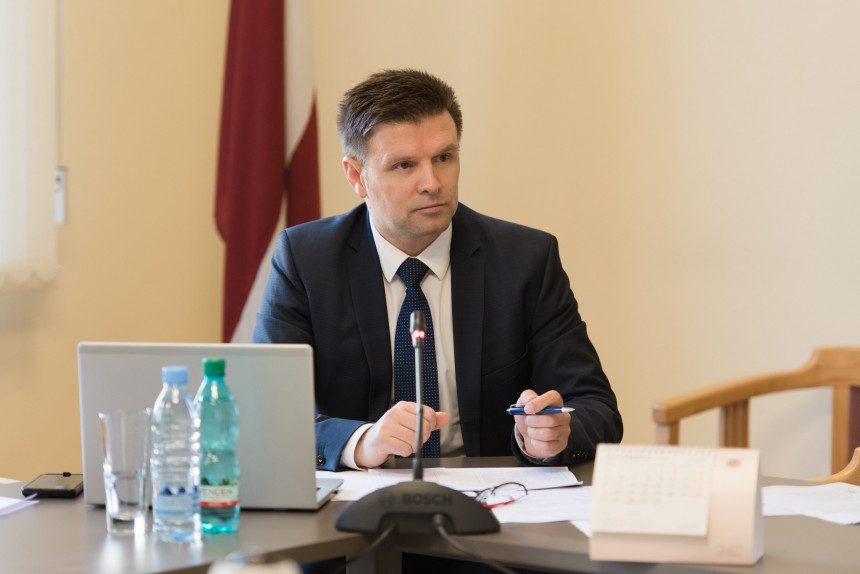MP Juris Rancāns: Volunteers are doing God's work defending Ukraine, but it is voluntary - we as a country are not sending soldiers

The Saeima on Monday, in an admirable unanimity that is now typical in issues affecting Ukraine, approved amendments to the National Security Law to allow Latvian citizens to fight on the Ukrainian side as volunteers.
The amendments were approved in concept by the Saeima Defense, Internal Affairs and Corruption Prevention Committee on Sunday evening. The changes are expected to enter into force the day after their promulgation.
Persons entering service in Ukraine will now have to register immediately with the reserve accounting unit of the National Armed Forces, according to the amendments.
The previous version of the law stipulated that a Latvian citizen was prohibited from serving in the armed forces, internal troops, military organization, intelligence or security service, police or judicial service of a foreign state or other international legal entity or its territory.
The Latvian legislator was prompted to do so by a call issued by Ukrainian President Volodymyr Zelensky on Friday for European citizens with combat experience to take up arms and defend Ukraine against the Russian attack. He also announced that an international territorial defense battalion is being set up in Ukraine, composed of foreigners willing to join the resistance against the Russian invaders and to defend world security.
After the law was approved by the Saeima, the Ministry of Defense issued a statement underlining that Latvian National Guards and professional soldiers are not allowed to fight as volunteers on the Ukrainian side.
At the same time, it is stressed that citizens should seriously assess their military knowledge and skills before engaging in active hostilities in Ukraine.
Juris Rancāns, Chairman of the Saeima Defense, Internal Affairs and Corruption Prevention Committee, who represents the New Conservative Party (Jaunā konservatīvā partija), explains why National Guards are not allowed to take part in the conflict in Ukraine and what responsibility the volunteers bear.
Why are National Guards prevented from fighting as volunteers on the Ukrainian side?
This applies to the National Armed Forces, and the National Guard is part of the National Armed Forces.
To decide on any deployment of our soldiers or armed forces abroad requires completely different mandates, separate decisions by the Saeima and the Ministry of Defense. And that would already be involvement in another country with our own military operation.
If we are talking about volunteers, there is no problem with people going there of their own free will without being part of our National Armed Forces. They will not be subject to any legal consequences by the state, that is the essence of the amendment to the law.
When the law was being drafted, was it determined how many Latvian citizens might choose to join Ukraine's fight for freedom?
There is no precise information at this point, but the Committee's advisers say that there have been a number of people who have sought information. We explain to them that all the information can be found on the website of the Ministry of Defense. Volunteers can also contact the military attaché at the Ukrainian Embassy in Latvia.
But our country needs to know how many people there are and which military units of the Ukrainian army they will serve in. We will need this information and therefore they have to apply to the Ministry of Defense and the National Armed Forces.
Does Latvia take any responsibility for its volunteers, such as insurance, or, when they go to fight on the Ukrainian side, does Ukraine and the volunteers themselves take full responsibility for the health and well-being of the Latvian citizen?
Yesterday [Sunday] there was a discussion on this in the Committee. It was said that they could be insured, but it is clear that no insurer will cover such risks.
When a person goes there, he is aware of his own risks and takes responsibility for himself. If he comes back and is, God forbid, injured, the country will give him medical care - what he is entitled to as a citizen of the country - but Latvia will not watch over him especially. That is the full competence of Ukraine, which is setting up this unit.
The volunteer himself is well aware of where he is going and why he is going, aware of all the risks. He himself takes responsibility. He is, of course, doing God's work in defending Ukrainian territory, the values of the European Union and also our security, but it is voluntary. We as a country are not sending soldiers.
Many people wonder whether we are provoking the enemy by our military presence. It is important to understand and distinguish here that Latvia is not sending its own soldiers, they are volunteers who are going themselves, and the state simply will not impose legal consequences on them for having fought on the Ukrainian side. It is important to make that distinction.
